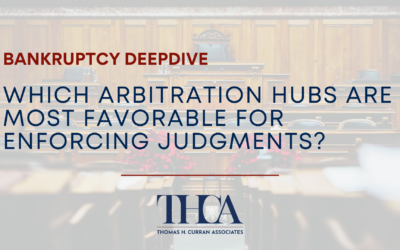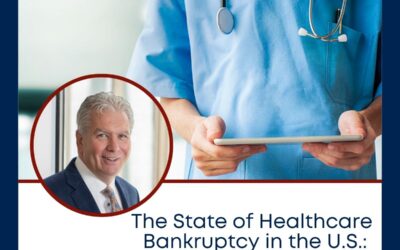Small Business Bankruptcy Resources
What are the bankruptcy options for small businesses?
Most small businesses in financial distress have four options for bankruptcy that allow them to either reorganize or liquidate.
- Chapter 7 bankruptcy is known as “liquidation bankruptcy” and is an option for financially troubled small businesses that are unlikely to return to profitability. When a business files for Chapter 7 bankruptcy, a bankruptcy trustee will sell all of its assets to repay creditors at least part of what they are owed. A business that declares Chapter 7 bankruptcy must cease operations at the conclusion of the bankruptcy process.
- Chapter 13 bankruptcy allows individuals who have a regular income to restructure their debt. However, small businesses owned and operated by individuals (sole proprietorships) may also file for Chapter 13 bankruptcy. Only debtors with unsecured debts of up to $419,275 and secured debts of up to $1,257,850 can file for Chapter 13 bankruptcy.
- Chapter 11 bankruptcy allows a business to continue its operations while reorganizing and restructuring its debts to return to profitability. Reorganizing under Chapter 11 bankruptcy is often expensive, complex, and time-consuming, so small businesses rarely use it.
- Subchapter 5 was added to the U.S. Bankruptcy Code in 2019 to give small businesses an option to restructure their debts under Chapter 11 under a procedure that is less burdensome and expensive than a typical Chapter 11 bankruptcy. Subchapter 5 is available to businesses with less than $2,725,625 in debt, but the 2020 Coronavirus Aid, Relief, and Economic Security (CARES) Act raised the debt limit to $7.5 million until March, 2021.
Since each type of bankruptcy has advantages and diadvantages, it is essential that business owners consult with an attorney before deciding which choice is right for their company.
What happens to personally guaranteed small business loans in bankruptcy?
A personally guaranteed loan allows for a business lender to go after the guarantor’s personal assets if the business defaults on the loan. For small businesses, the person offering the personal guarantee is usually an owner or co-owner. In practice, this allows a lender to sue a business owner for any unpaid amounts owed by a business that has declared bankruptcy.
However, a business owner will often file for personal bankruptcy to prevent the lender from collecting the debt. Most personal guarantees may be discharged through personal bankruptcy.
What happens to business assets in bankruptcy?
In Chapter 7 bankruptcy the business’s assets are liquidated with any profits divided among the company’s creditors. In a Chapter 11, Chapter 13, or Subchapter 5 case, business assets usually remain with the company during the repayment process. In some cases, the Bankruptcy Court may allow debtors in those types of bankruptcy proceedings to sell some business assets to satisfy creditors.
What is an involuntary bankruptcy?
Sometimes creditors will try to force a business to repay its debts and file an involuntary bankruptcy petition on its behalf. The petition is similar to a complaint in which the creditor asks the Bankruptcy Court to declare the business bankrupt. Involuntary bankruptcy must be filed under either Chapter 7 or Chapter 11 bankruptcy after a business has stopped paying its debts when they come due or a receiver has control of the business’s property to enforce a lien within the past 120 days.
The filing of an involuntary bankruptcy initiates an automatic stay barring future creditor actions but allows the business to continue its operations. A business may consent to the involuntary bankruptcy or file its own voluntary Chapter 11 petition to control the proceedings.
Can I dissolve my business without filing for bankruptcy?
Small businesses experiencing financial trouble are not required to file for bankruptcy. Its owners may simply cease operations and dissolve the business. However, if the owners do not file a business bankruptcy, the creditors of the dissolved business are free to continue trying to collect their debts and pursue legal action to obtain payment. Filing for bankruptcy allows the owners of a business to resolve their outstanding debt and provides them with legal protection against future actions by creditors.
Can Thomas H. Curran Associates help with my small business bankruptcy?
When a small business is experiencing financial difficulties and its owners are considering bankruptcy, a lawyer from Thomas H. Curran Associates can help determine whether bankruptcy is the best option for their situation and what type of bankruptcy would benefit them the most. The bankruptcy attorneys at our law firm have represented businesses of all sizes. They have the knowledge necessary to advise and represent small business owners, whether they are seeking to restructure their debt to continue operations or shut down the company in an orderly manner.
Bankruptcy Practice Results
Recent successful cases handled by the attorneys from Thomas H. Curran Associates. Find more here »
Supreme Court Denies Final Appeal, Finalizing Judgement Obtained by THCA
On June 24, 2024, the Supreme Court of the United States declined the petition to review filed by Sean Dunne and his ex-wife Gayle...
Thomas H. Curran Associates Secures Appellate Victory as Massachusetts Supreme Judicial Court Denies Appellant’s Attempt to Shortcut Ordinary Appellate Review
Thomas H. Curran Associates recently obtained an appellate victory in the Massachusetts Supreme Judicial Court on May 26, 2023, in the...
Thomas H. Curran Associates win is Affirmed in Florida, U.S. District Court – Client Wins Attorneys Fees
Law: Federal Rule of Civil Procedure 37(a)(5) Case: Premier Capital, LLC v. Larry Bryan (AP) Underlying Bankruptcy Case: In re Larry Bryan...
The Second Circuit Affirms Bankruptcy Fraud Judgment Obtained by Thomas H. Curran Associates, Recognizing the Continuous Concealment Doctrine
Law: Continuous concealment doctrine, 11 USC § 727(a)(2)(A), In re Olivier, 819 F.2d 550 (5th Cir. 1987); In re Boyer, 328 F. App’x 711,...
Thomas H. Curran Associates prevails on barring discharge due to fraud by debtor
Thomas H. Curran Associates recently secured a victory on behalf of an institutional asset manager, where the Bankruptcy Court for the...
Thomas H. Curran Associates prevails on post-trial motions and obtains full security for $23 million dollar financial fraud judgment on behalf of chapter 7 bankruptcy trustee
On February 8, 2022, the United States District Court for the District of Connecticut (Meyer, J.) enter its Order denying defendant Gayle...
Supreme Court Denies Final Appeal, Finalizing Judgement Obtained by THCA
On June 24, 2024, the Supreme Court of the United States declined the petition to review filed by Sean Dunne and his ex-wife Gayle...
Thomas H. Curran Associates Secures Appellate Victory as Massachusetts Supreme Judicial Court Denies Appellant’s Attempt to Shortcut Ordinary Appellate Review
Thomas H. Curran Associates recently obtained an appellate victory in the Massachusetts Supreme Judicial Court on May 26, 2023, in the...
Thomas H. Curran Associates win is Affirmed in Florida, U.S. District Court – Client Wins Attorneys Fees
Law: Federal Rule of Civil Procedure 37(a)(5) Case: Premier Capital, LLC v. Larry Bryan (AP) Underlying Bankruptcy Case: In re Larry Bryan...
The Second Circuit Affirms Bankruptcy Fraud Judgment Obtained by Thomas H. Curran Associates, Recognizing the Continuous Concealment Doctrine
Law: Continuous concealment doctrine, 11 USC § 727(a)(2)(A), In re Olivier, 819 F.2d 550 (5th Cir. 1987); In re Boyer, 328 F. App’x 711,...
Supreme Court Denies Final Appeal, Finalizing Judgement Obtained by THCA
On June 24, 2024, the Supreme Court of the United States declined the petition to review filed by Sean Dunne and his ex-wife Gayle...
Thomas H. Curran Associates Secures Appellate Victory as Massachusetts Supreme Judicial Court Denies Appellant’s Attempt to Shortcut Ordinary Appellate Review
Thomas H. Curran Associates recently obtained an appellate victory in the Massachusetts Supreme Judicial Court on May 26, 2023, in the...
Thomas H. Curran Associates win is Affirmed in Florida, U.S. District Court – Client Wins Attorneys Fees
Law: Federal Rule of Civil Procedure 37(a)(5) Case: Premier Capital, LLC v. Larry Bryan (AP) Underlying Bankruptcy Case: In re Larry Bryan...
Bankruptcy Areas of Expertise
- Bankruptcy Litigation
- Bankruptcy Trustee Representation
- Avoidance & Recovery Actions
- Chapter 11 Trustees & Examiners
- Discharge Litigation
- Bankruptcy Fraud Investigations
- Cross Border Foreign Litigation
- 363 Bankruptcy Sales
- Bankruptcy Preference Actions
- Involuntary Bankruptcy
- Chapter 11/13 Plan Objections
Bankruptcy News
Judicial Comity Meets Sovereign Debt
Judicial comity is a discretionary doctrine by which U.S. courts recognize the legislative, executive, or judicial acts of another nation,...
Global Insolvencies Are Rising Again – What To Expect in 2026
After several years of economic turbulence, a renewed rise in global insolvencies is expected in 2026. According to Allianz Trade’s Global...
Which Arbitration Hubs Are Most Favorable for Enforcing Judgments?
As insolvency disputes increasingly intersect with international arbitration, creditors are asking: which jurisdictions provide the most...
Crypto Bankruptcies and the Push for Custody Reform
The crypto sector remains under intense financial and regulatory scrutiny. The U.S. House of Representatives passed the Digital Asset...
The State of Healthcare Bankruptcy in the U.S.: Why 2025 Is a Turning Point
Jennifer Riggins sits down with Thomas Curran, Managing Partner of Thomas H. Curran Associates, to unpack the accelerating wave of...
Expanding in the Southwest: From Insolvency in Oklahoma to Asset Recovery in Texas
In this episode, Jennifer sits down with Thomas Curran, founder of Thomas H. Curran Associates, to explore the rapidly evolving world of...
Judicial Comity Meets Sovereign Debt
Judicial comity is a discretionary doctrine by which U.S. courts recognize the legislative, executive, or judicial acts of another nation,...
Global Insolvencies Are Rising Again – What To Expect in 2026
After several years of economic turbulence, a renewed rise in global insolvencies is expected in 2026. According to Allianz Trade’s Global...
Which Arbitration Hubs Are Most Favorable for Enforcing Judgments?
As insolvency disputes increasingly intersect with international arbitration, creditors are asking: which jurisdictions provide the most...
Crypto Bankruptcies and the Push for Custody Reform
The crypto sector remains under intense financial and regulatory scrutiny. The U.S. House of Representatives passed the Digital Asset...
Judicial Comity Meets Sovereign Debt
Judicial comity is a discretionary doctrine by which U.S. courts recognize the legislative, executive, or judicial acts of another nation,...
Global Insolvencies Are Rising Again – What To Expect in 2026
After several years of economic turbulence, a renewed rise in global insolvencies is expected in 2026. According to Allianz Trade’s Global...
Which Arbitration Hubs Are Most Favorable for Enforcing Judgments?
As insolvency disputes increasingly intersect with international arbitration, creditors are asking: which jurisdictions provide the most...
Contact Us
Are You In Need of Legal Counsel for a Bankruptcy Matter, Business Transaction, or Commercial Litigation?
Contact our team today.
Call us at (617) 207-8670 or use the quick contact form below.
Austin Office
7710 N. FM 620
Building 13-D
Austin, TX 78726
Boston Office
15 Broad Street
Suite 610
Boston, MA 02109
New York Office
305 Broadway, Suite 700
New York, NY 10007
London Office
The Leadenhall Building
Level 30
122 Leadenhall Street
London EC3V 4AB
Tags: small business bankruptcy attorney small business bankruptcy lawyer small business bankruptcy chapter 11






